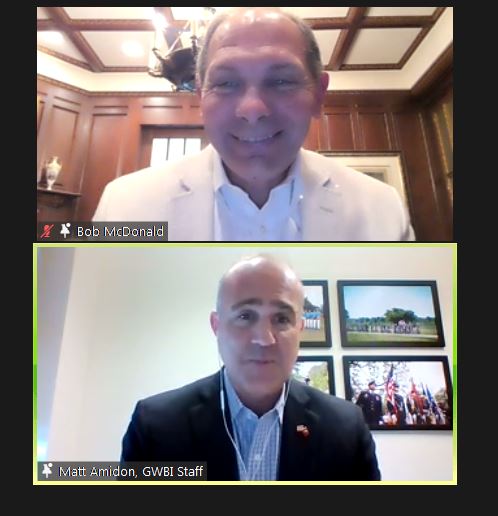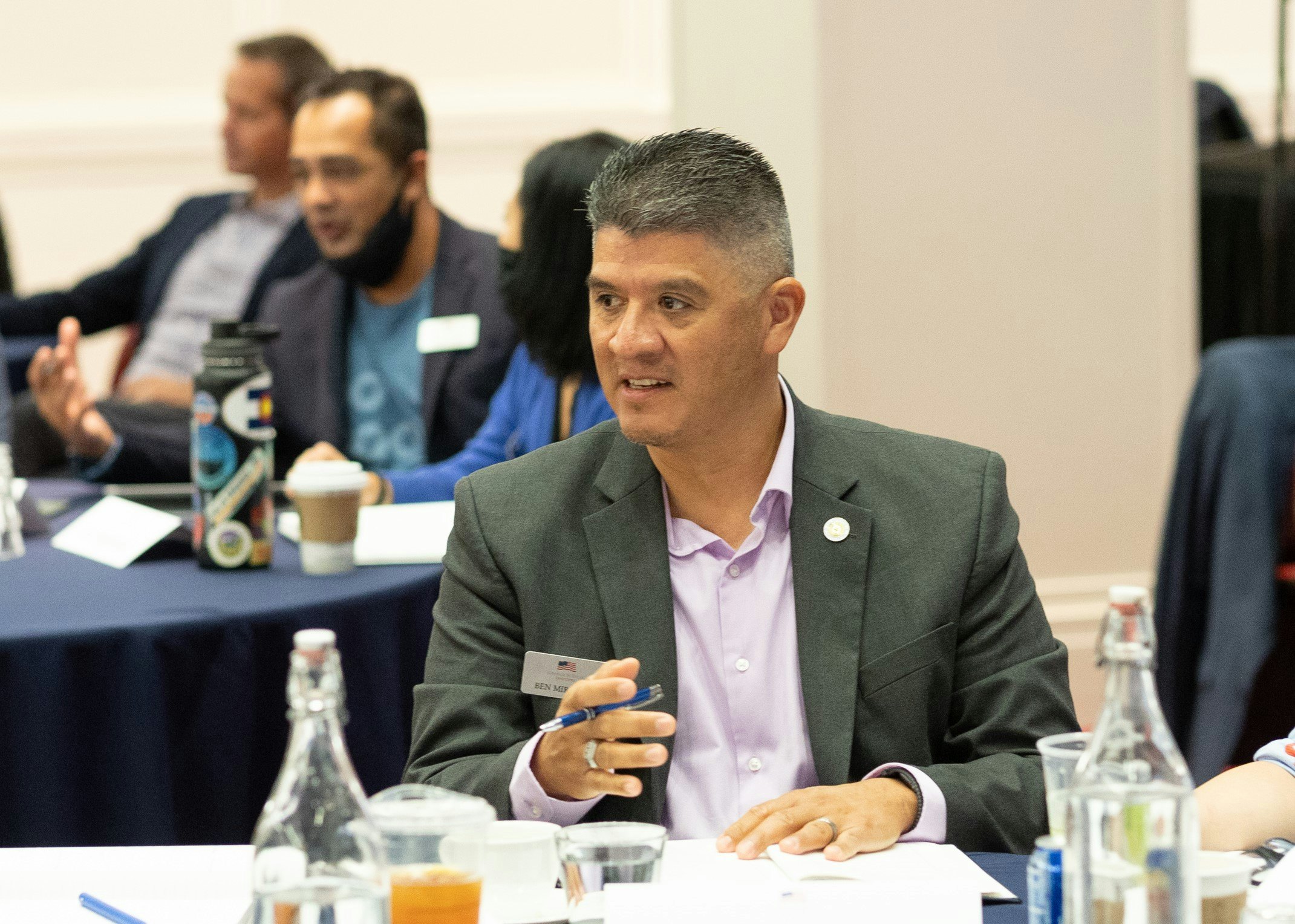Recently, the 2021 Class of the Stand-To Veteran Leadership Program convened virtually for their first and second modules. Scholars learned about the foundations of leadership, the power of data, outcome-based investments, the Bush Institute’s Military Service Initiative, and more. They also heard from a variety of speakers, who provided the below advice to the new class.
Recently, the 2021 Class of the Stand-To Veteran Leadership Program convened virtually for their first and second modules. Scholars learned about the foundations of leadership, the power of data, outcome-based investments, the Bush Institute’s Military Service Initiative, and more. They also heard from a variety of speakers, who provided the below advice to the new class.
Christina Lowhorn, VLP Class of 2018
“This program changed my trajectory.
My advice – Jump into this journey. Dive in. Wring it out. Get everything out of it. The investment in you from the Bush Institute is not just a fixed point of time, you get what you put into it, and it lasts a lifetime.”
Seema Reza, VLP Class of 2019
“I didn’t know what to expect (when I started the program), but I knew what I needed to do was to listen radically. That really served me – and to be around people who I felt were willing to speak in a way that explained things I was already expected to know. Everything changed for me. It was the community of people around me – and that has lasted, and I know will continue to last.”
April and Jay Graham Fellow at the George W. Bush Institute Secretary Bob McDonald

“I’m a huge believer in the power of diversity and inclusion, because innovation occurs when people bring their whole self to the task. And their whole self means the layered experiences they’ve had through their lives.”
“Leadership is the scarcest quality in the universe, yet the one that is needed the most.”
“I don’t know of a great leader who isn’t humble. With humility, you really work hard to know your people and to create trust.”
NASA Astronaut Lt. Jonny Kim
“How we treat other people is so important. People are the cornerstone of our organizations – it doesn’t matter what we are talking about. People are the backstone of what we do. And how we treat other people with respect and grace reflects our leadership.”
“Generating space excitement is good for everyone. I know that sometimes people wonder if there is competition or a space race…if you look throughout history, the government has taken risk to set up infrastructure so that the rest of humanity can continue that exploration.”
“I’m a big believer in living in the moment and maximizing your potential no matter what you are doing. Interpersonal connections and treating people with respect and grace has been the fundamental stone for everything that has launched me into all of the different opportunities I’ve had.”
“There’s a certain level of appreciation for someone who has to walk away from their loved ones to serve a cause greater than themselves….Knowing the impact we have, the sacrifices we make, and how we serve humanity – it makes it worthwhile.”
“People generally want good things and the same outcome, they just disagree in how we get there. Ironically, the same aspects of humanity that make us good are the same elements that get in the way of us getting from point A to point B. We have to have more discipline of our own personal emotions and to disengage ourselves more often.”
“We have a core full of talented and amazing people. What keeps me humble is knowing how many qualified applicants out there who can do this job, but just don’t have the opportunity.”
“Often times, the best mental health resource I’ve had has been with non-mental health experts. But instead, having vulnerable conversations with people you trust. When we remove the façade that we have to be tough, it enables us to get to the conversations that are really important for our mental health.”
“Diversity of experience and perspective is iso important in what we do to complete the mission. Hopefully one day we are living in a world where meritocracy and diversity aren’t thought of as mutually exclusive by people, but it’s going to take an era of public and civil servants who don’t seek recognition, but just want to do good.”
“We can all be allies for each other and prop each other up.”
NASA Astronaut Victor Glover
“If there’s anything that I want to make my NASA career about, it’s showing the process, not the product. If there’s one thing we all have in common, it’s how hard we work.”
“All space is good. Everything we are doing is inspiring folks and pushing the economy forward. The folks that are out there changing the game and putting more people in space are working right there with us…we are all working together.”
“The universal romance and fascination that people have with aerospace seems to be a universally positive thing, which to me is one of the strongest aspects of what we get to do. With so many things in the world right now trying to sperate us, we have to squeeze every drop of what unites us.”
His advice to a young, aspiring astronaut: “I stick to these three things in my life: 1. It’s important to be resilient. 2. Be a lifelong learner. 3. Be a good teammate. And one “secret” – Listen to your dad. The reason I like these three things so much, is there’s something you can decide to do right now.”
“I showed up at NASA, had my first flight physical, and then went to see a psychiatrist and psychologist. I left that talk and realized I had never met with a mental health specialist before. I don’t know why we don’t do this for everyone. It’s one of the things that I think is a really special aspect of our wellness here as astronauts.”
On diversity: “It’s one thing to talk it, but people relate when they can see someone like them walking it. It helps them to see themselves there. Until things do change in a major way and there are more doctors, Navy seals, and astronauts that look like Jonny and me, we’re going to have the same environment.”
Superintendent David Brown

“I came to Chicago to make a difference. I thought it would be the most challenging police chief job in the country, and man was that true. It has been the challenge of a lifetime, but I am here to make a difference.”
“Because I wear this uniform, I not only represent the broken trust that policing has experienced, but also I represent this uniform of governments ability to enforce the law.”
“I have to instill a neutrality, because we police in every neighborhood in the city. Every neighborhood is unique in its own way, and they’re also politically unique. Much of what happens in our politics today is orbiting around race, which could really divide your city as a police department if you are perceived as bias politically.”
“I am pro police unapologetically, because of the courage and the heroism they have to protect all of us. But at the same time, I have humility for the people we have to enforce the law on.”
“Are you really willing to serve people and put others first before you? Because that is what is really needed right now as leaders. We have to be strong enough as leaders to risk our leadership positions to do what is right.”
“I truly believe that we can improve all of our lives without being so disagreeable. We can all see a better and brighter day – I am convinced of that. But it’s going to take commitment and risk to our personal leadership to accomplish that.”
“The culture of policing needs to change. It needs to be more diverse. We need more women. We need to reform our policy, as well as acknowledge the courage and bravery that it takes to be a cop today. I do not think those things are in competition with each other.”
The Scholars will convene in-person for the first time this August in Dallas for their third module.






























